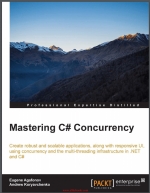Mastering C# Concurrency. 2015. A. Koryavchenko, E. Agafonov

Категория: C#
Поделиться:
Recent C# and .NET developments involve implicitly using asynchrony and concurrency, even when you are not aware of them. This can lead to further problems since many details are usually hidden inside the C# language infrastructure and the .NET base class library APIs. To avoid problems and to be able to create robust applications, a developer has to know exactly what is going on under the hood of asynchrony in .NET. Besides this, it is important to understand your goals when writing a concurrent application. If it is running on the client, it is usually a good thing to use all the computational resources available so that the application becomes as fast as possible. This involves effective multiple CPU cores usage, and thus requires parallel programming skills. However, if the application is running on the server, it is more important that the server supports as many clients as possible, than the performance of a concrete client request processing. This requires a programmer to distinguish asynchrony from multithreading and have an understanding of scalability. All these topics will be covered in this book, providing you with enough information to achieve a solid understanding of asynchronous and parallel programming in C#. We will start with basic multithreading concepts, review common concurrent programming problems and solutions, and then we will go through C# and .NET support for writing concurrent applications. Further in the book, we will cover concurrent data structures and patterns, and we will review client-side and server-side concurrency issues. At the end of the book, we will outline the basic principles for creating robust concurrent programs.
Скачать
Комментарии